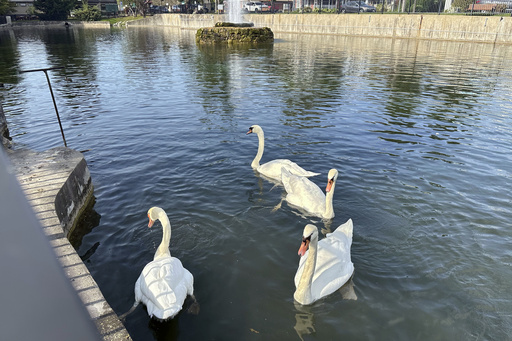MANLIUS, N.Y. — In the small village of Manlius, New York, spanning under 2 square miles, elegant mute swans hold a significant cultural and aesthetic presence. Their images adorn village flags, community centers, and welcome signs, and each fall, locals celebrate an event called “Swan Fest.”
For over a century, the mute swans have graced a pond in the village center, becoming an integral part of the community’s identity. However, the sudden and violent killing of one of the village’s swans in 2023 has ignited a conflict with state regulators, compelling Manlius to confront a challenging choice about the future of these beloved birds.
As the year draws to a close, Manlius faces stark options: either keep its remaining four mute swans but sterilize them or retain only two swans of the same sex. Both choices would effectively end the village’s cherished tradition of watching the swans raise their young and could signal a potential end to their longstanding presence in Manlius.
Mayor Paul Whorrall, a long-time resident with childhood memories of the swans, expresses a deep attachment to them. “If you take away the swans, you’re taking away a lot of the identity of the village,” he remarked, underscoring their importance to the community.
In recent years, the state of New York has sought to decrease the number of mute swans, treating them as an invasive species. Since their introduction from Europe in the late 1800s, their population has surged, with a significant concentration in areas like Long Island and the lower Hudson Valley. Although visually stunning, the state’s Department of Environmental Conservation (DEC) argues that these large birds damage ecosystems, pollute water with their waste, and deplete underwater vegetation vital for other wildlife.
According to the DEC, the aggressive behavior of the mute swans can also lead to conflicts with humans and displacement of native species. Under a management plan initiated in 2019, the possession of mute swans in New York requires DEC approval. Manlius previously held a license allowing them to maintain a pair of adult swans, which would raise cygnets that were relocated before they could reproduce.
The tragic incident involving the swans last year led to changes. Three teenagers from Syracuse apprehended the swan named Faye along with her cygnets, resulting in Faye’s death. Following the incident, one remaining adult swan, Manny, was relocated due to adverse behavior towards the cygnets, leaving the village with just four young swans.
This situation has left Manlius no longer compliant with its licensing requirement for two adult swans. As the expiration of their revised license approaches, residents worry that the DEC’s current options—sterilizing the young swans or retaining only two of the same sex—will ultimately lead to the disappearance of mute swans from their pond. The DEC has suggested replacing them with trumpeter swans, a proposal met with resistance by many villagers.
Martha Ballard Lacy, at 89 years old, has fond memories of daily walks around the pond, where she often took photographs of Manny and Faye, who had been part of the landscape since 2010. “The town loves having a place to come to and identify themselves with something that’s been here for 100 years,” she remarked.
The state has struggled with management plans for mute swans for years. In 2013, the DEC set an ambitious target to eliminate free-ranging mute swans by 2025, sparking public backlash against proposals to euthanize them or destroy their eggs. The agency later revised its approach with a plan focused on non-lethal measures such as egg-addling while still permitting culling in certain circumstances.
While Whorrall acknowledges that mute swans may pose issues in other locations, he believes that their confinement within the village pond does not contribute to the broader problem. Recently, local families have continued to enjoy watching the swans interact with their environment, throwing food for them to retrieve from the water.
As the deadline nears, Whorrall emphasizes the village’s goal to maintain the same setup, having already committed to meet the state’s requirements, including installing educational displays about wildlife at the pond. He even stated that they agreed to sterilize any young swans prior to their removal if it preserved their breeding tradition, although the DEC later retracted that option.
The DEC maintains that it is engaged with Manlius to ensure compliance with state regulations and management objectives. Villagers feel deeply affected by Faye’s death and the ongoing conflict, with Whorrall explaining, “You have to do what you can to move on. And that’s what we’re doing, we’re trying to move on. And they’re making it hard to move on.”


